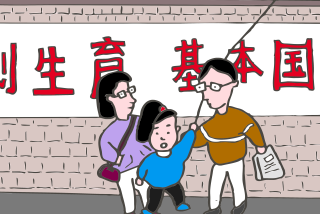Three-Year-Olds East and West : PRESCHOOL IN THREE CULTURES Japan, China, and the United States <i> by Joseph J. Tobin, David Y.H. Wu and Dana H. Davidson (Yale University Press: $26.95; 240 pp., illustrated; 0-300-04235-3) </i>
In this important study of the way preschools both reflect and affect social change, Joseph J. Tobin, David Y. H. Wu, and Dana Davidson lead the way through a diversity of cultures--communitarian, Communist and democratic--and a maze of research--referencing 173 publications--into a surprising commons: the care and nurturing of “our” young children. Through the use of videotapes and dialogues, they explore this territory with children, parents, preschool staff and administrators. The result is an enticing journey.
Tobin, degreed in human development, also trained in psychology and anthropology, is doing field work in Japan, where his son attended preschool for a year. Wu, a cultural anthropologist from Taiwan, has studied parenting, social organization, and mental health in Taiwan, the People’s Republic, and in overseas Chinese communities. Davidson is degreed and experienced in early childhood education in teaching, administration and teacher training.
The authors, who met at the University of Hawaii’s East-West Center, bring a formidable wealth of learning and life experiences to this project. While one might expect a writing of such profound academia to be overwhelming, “Preschool in Three Cultures” invites reading. Its style is clear, its methodology fascinating.
“Preschool in Three Cultures” is not an evaluation of which country, political system or culture does the best job with early childhood care and education. The authors looked at what preschools are meant to do and to be. What do preschools provide? For whom? Parents? Children? Society? How are the perceptions about students’ needs, behaviors and responses different or the same between these three cultures?
Japan, China, and the United States have undergone major social reorganization within the last 25 years. All three cultures have experienced: reduced birth rates, allowing more time, energy and expectations to be focused on each child but at the same time freeing women from long-term commitments to the caring of (their own) small children; increased numbers of women in the workplace for both economic and personal-choice reasons, including mothers and other female relatives who may have in previous generations been available to share in the rearing of children; the removal of primary family units from extended family, usually rural, to more isolating, usually urban, locals; and, the continued economic discounting of areas perceived as “woman’s” domain, i.e., salaries received by women and the low status, economics, gender predominance and lack of governmental and business priority of early childhood education and care programs.
Tobin et al make a major point that the perception of how things are may be more important in determining parental and social responses than the reality of the way things are. For example, single children in China are assumed to be spoiled (overindulged) by parents and grandparents in spite of any real evidence of widespread practice. In the United States and in Japan, neighbors are perceived to be less friendly and safe than in the past. Children must have adult supervision to be outside of the home.
In the United States, non-familial care of children is seen as detrimental to and undermining of American values, families and society. Yet Tobin et al have some strong and thought-provoking evidence that demonstrates that preschools may be at the frontline of conserving social structures and values. (We are and we do.)
The journey is divided into five segments (chapters): A precise, careful, comfortable walk through techniques and methods is shared; Japan is visited; China is explored; the United States is observed; and, last, a thought-provoking analysis of what one saw and experienced through the three venues is stirring. This is not a trivial exploration. It is scholarly and detailed but readily readable. There is much of interest for those in early childhood education and related areas and services.
The implications of this study are most profound for those who are on the frontline of leadership and change in our world. Secretary of Education Lauro Cavazos recently stated that our focus as a nation needs to be on early childhood education and care.
“Preschool in Three Cultures” is a must read for those who take social issues seriously.
More to Read
Sign up for Essential California
The most important California stories and recommendations in your inbox every morning.
You may occasionally receive promotional content from the Los Angeles Times.









